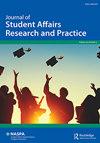The Pathogenesis of Adrenoleukodystrophy
IF 0.8
Q3 EDUCATION & EDUCATIONAL RESEARCH
Journal of Student Affairs Research and Practice
Pub Date : 2023-05-31
DOI:10.47611/jsrhs.v12i2.4272
引用次数: 0
Abstract
Adrenoleukodystrophy (ALD) is a rare, inherited disorder that affects the brain, spinal cord, and adrenal glands. It is caused by mutations in the ABCD1 gene, which provides instructions for making a protein called ABCD1, which is involved in the metabolism of very long-chain fatty acids (VLCFAs). In ALD, the body cannot properly break down and clear VLCFAs, which can lead to the accumulation of these fatty acids in the brain and other tissues. This accumulation can cause inflammation and damage to cells and tissues, leading to various symptoms. Symptoms of ALD may vary depending on the type of ALD and the severity of the condition. Common symptoms include neurological problems, such as difficulty walking, speaking, behavioral changes, and problems with the adrenal gland, such as adrenal insufficiency which is a condition in which the adrenal glands do not produce enough hormones. ALD is a progressive disorder, meaning symptoms may worsen over time if left untreated. Treatment for ALD typically involves medications and supportive care to manage symptoms and prevent complications. Sometimes, a bone marrow transplant may be recommended to replace damaged cells and tissues. Genetic testing is available for ALD and can be used to diagnose the disorder and identify people at risk of developing it. Early diagnosis and treatment can help improve the chances of a full recovery and a good quality of life for people with ALD.肾上腺脑白质营养不良的发病机制
肾上腺脑白质营养不良(ALD)是一种罕见的遗传性疾病,影响大脑、脊髓和肾上腺。它是由ABCD1基因突变引起的,该基因为制造一种名为ABCD1的蛋白质提供指令,这种蛋白质参与了长链脂肪酸(VLCFAs)的代谢。在ALD中,身体不能适当地分解和清除VLCFAs,这可能导致这些脂肪酸在大脑和其他组织中积累。这种积累会引起炎症,损害细胞和组织,导致各种症状。ALD的症状可能根据ALD的类型和病情的严重程度而有所不同。常见的症状包括神经系统问题,如行走困难、说话困难、行为改变和肾上腺问题,如肾上腺功能不全,即肾上腺不能产生足够的激素。ALD是一种进行性疾病,如果不及时治疗,症状可能会随着时间的推移而恶化。ALD的治疗通常包括药物治疗和支持性护理,以控制症状和预防并发症。有时,可能会建议进行骨髓移植来替换受损的细胞和组织。ALD的基因检测是可用的,可以用来诊断这种疾病,并确定有患病风险的人。早期诊断和治疗可以帮助提高老年痴呆症患者完全康复的机会和良好的生活质量。
本文章由计算机程序翻译,如有差异,请以英文原文为准。
求助全文
约1分钟内获得全文
求助全文
来源期刊

Journal of Student Affairs Research and Practice
EDUCATION & EDUCATIONAL RESEARCH-
CiteScore
2.40
自引率
9.10%
发文量
50
期刊介绍:
The vision of the Journal of Student Affairs Research and Practice (JSARP) is to publish the most rigorous, relevant, and well-respected research and practice making a difference in student affairs practice. JSARP especially encourages manuscripts that are unconventional in nature and that engage in methodological and epistemological extensions that transcend the boundaries of traditional research inquiries.
 求助内容:
求助内容: 应助结果提醒方式:
应助结果提醒方式:


